- Home
- K. A. Tucker
Until It Fades Page 7
Until It Fades Read online
Page 7
“Doctor said at least two weeks, likely three,” my mother throws in, her eyes on the dessert tent card menu tucked into the condiments stand.
Lou sighs. “Well, at least you’re all right. I guess this happened on your way home from your date with Gord?”
Ugh. I’d completely forgotten about him until now.
My father perks up. “Date?”
“Yes, with my nephew.” Wiping her hands on her apron, Lou only now takes in my parents, her polite mask usually reserved for customers who she doesn’t know sliding on smoothly. “Hello. I hope you’re both well.” They haven’t seen each other in years, since the last night my parents came in here, demanding to meet Brenna. Lou told my mother what she thought of her for how she handled the entire Scott Philips incident—it wasn’t complimentary—and my mother told Lou that since her only son is in prison for armed robbery—of Diamonds—she had no business pretending she knew how to raise a child.
That dagger was well placed on my mother’s part.
Lou threw a dagger of her own, telling my mother she was no longer welcome at the diner.
“We’re fine. Thank you for asking.” Hildy Wright has a mask of her own, and it’s firmly in place now.
There’s a sudden clatter in the kitchen, and Lou uses that as her excuse to escape the awkward situation. “I’ll give you a few minutes to look over the menu.” Reaching down to ruffle Brenna’s hair again, she adds, “And Leroy will start on those fingers right away. Extra crispy, just how you like them.”
“So? Who’s this nephew you went on a date with?” Mom casually asks while she rearranges the sugar packets so they’re grouped by variety and tidy in their holder.
“We can talk about that later.” My parents catch my pointed glance at Brenna, who will no doubt repeat every unflattering comment word for word to Lou if asked.
“Are the wings still good here? I remember them being good.” Dad slips on his reading glasses and draws his finger down the length of the menu.
“Same recipe.” Leroy learned his lesson once, tinkering with the ingredients in the Diamonds burger patties. He’ll never try that again.
“Well, then, that was easy.” He pushes the menu away, folding his glasses and tucking them in his shirt pocket, before letting his gaze wander over the place.
Mine follows. There are plenty of regulars, but a lot of new faces, too. And I can spot the news crews right away. Three tables of them, the cameramen in casual attire—jeans or cargo pants, brown suede jackets—sitting across from their counterparts, the more polished reporters, dressed in button-down shirts and pressed trousers, ready to hop in front of a camera with sixty seconds’ notice should the need arise. Each one grasps a white porcelain coffee mug as if its contents are the only thing keeping them alive.
I doubt they’ve slept since hearing about the accident.
Their very presence makes me anxious.
“Relax, kid. Everything will be fine.” Dad reaches over and pats my forearm. “And no matter what happens, you just hold your head up high. You have every reason to.” He ends that on a husky note.
“Thanks, Dad.” I could have used that same sentiment seven years ago, but I’ll gladly accept it now, with a smile.
“What are you doing here!”
I’m so on edge, I jump at Misty’s sudden outburst beside me. Her giant round eyes—too large for the rest of her features, really—take my family in with curious interest as she slides a plate of fries in front of Brenna. “To tide you over,” she whispers with a wink before turning back to me. “I thought you weren’t coming in today.”
“I’m just here to grab my check. And eat.”
“Right. Lou asked me to take your orders.” She scrunches her button nose as she sees my wrist. “Ow! How’d you do that, again?”
“Oh, I fell. Clumsy . . .” I try to cast it off as no big deal.
“But I thought you were in a—”
Dad shoves a french fry into Brenna’s mouth, cutting her off before she outs me again. Thank God, too, because every last regular in here will hear about it before I leave if Misty catches wind. She has a hard time keeping secrets. That she’s never said a word about Brenna’s father to anyone—as far as I know—is no small miracle.
“So, how has it been today?” I ask, steering the bubbly blonde off the topic of my wrist.
“Busy. Especially with all these newspeople coming in and out of here. Did you hear about that accident last night with those two hockey players? Oh, my God!” She presses her notepad to her ample chest, the top button popped to earn herself a few extra bucks in tips from the single truckers who come through here. While I’d never describe Misty as beautiful, with her apple cheeks and her expressive blue eyes, she has a certain cuteness factor that seems to attract a lot of guys. She’s never searching too long for the next date, that’s for sure. “It’s absolutely horrible! Someone said that the driver burned to death! Ugh! Imagine seeing that. How awful!”
“I’ll have a pound of wings,” my dad announces, his eyes flickering to me before turning to my mom. “Hildy?”
“A chicken Greek salad, please.”
Misty gives her head a little shake, as if just remembering that she’s here to take an order. “Of course. The usual, Cath?”
“Sure,” I mumble, though I can’t possibly stomach a club sandwich, my appetite still missing.
“’Kay! I’ll ring these up straightaway!” she chirps, ever oblivious.
“She’s . . . cheery,” my mom says, though I don’t doubt she’s using another word in her head to describe Misty, and it’s not an entirely flattering one.
Lou has reappeared from the kitchen, her arms loaded with a tray of glasses for the drink fountain. I feel the urge to get up and help her, but I wouldn’t be much use right now, and she’d only yell at me to sit. She’s a fifty-nine-year-old lady, but she has more energy than most of the waitstaff at Diamonds.
“Turn it up!” Jimmy, a Saturday regular, hollers, pointing at the flat-screen hanging over the serving counter, where someone’s flipped the channel over from the baseball game to CNN.
The diner can hold ninety-six customers, and I swear, every last head turns to take in the charred wreckage of the Corvette that flashes across the screen, surrounded by police tape. The fog and the darkness helped dull the raw tragedy of the scene last night, but now in broad daylight, nothing can hide. Not the singed bulrushes, not the blackened trunk of the oak tree where the bark caught fire. I wonder if it will survive that wound.
A woman with high cheekbones and flawless olive skin stands to the right of the screen, giving the camera the opportunity to capture the bleak scene in the background.
“After sweeping Boston and Florida in four games apiece, Philadelphia Flyers right wing Seth Grabner and Captain Brett Madden were on a break before the Eastern Conference finals begin next Friday, and driving to a team gathering at franchise owner Sid Durrand’s mountain house when the accident occurred. As you can see behind me, there is a near ninety-degree bend in this side road. Police believe that foggy conditions and speed may have been factors in the crash that left Grabner dead and Madden in the hospital. Police are reluctant to release details, but they have confirmed that a witness was at the scene of the accident.” The screen pans to poorly lit video footage from last night, of Keith weaving around the barrier in his cruiser, a person with a dark gray blanket over her head sitting in the passenger seat.
I feel the blood drain from my face.
That’s me.
“This witness is being credited for saving Madden’s life, pulling him from the wreckage before the fire could claim him.”
“Oh, my God!” Misty gasps, gaping at the TV along with everyone else. “Do you think it’s someone we know?” she asks, to no one in particular.
“The Balsam County Sheriff’s Department has not yet released the name; however, we suspect that the person is the driver of this car.” The camera pans and zooms in on my Grand Prix.
; I’m torn between the urge to run out the door and crawl under the table. In the end, I accept that neither is an option and simply sink into my chair.
It’s a Grand Prix, though, I remind myself. There are plenty of them. There’s no reason to automatically tie that car to me. And it’s not even really recognizable as a Grand Prix, what with the damage. Misty, who’s been in the car plenty, hasn’t so much as glanced here. If she hasn’t made the connection yet, I’m probably safe.
I feel eyes boring into my face.
Lou, staring intently at me from across the way.
I duck my head as she approaches, focusing on the menu that Misty forgot to collect. I memorized it front to back years ago and nothing has changed except the prices.
“Cath, why don’t you come back to the office with me for a minute, to get that paycheck of yours.” There’s that tone, the one where I know I can’t get out of this so I shouldn’t bother to argue. And I never argue with Lou, even though sometimes she gives me more grief than my mother ever did.
Not until she pulls her office door shut behind me, enclosing us in the cramped room, does she speak again. “Catherine . . .”
She uses my full name only when she’s annoyed with me, which is rare.
I sigh. “Yes?”
“That was your car on the news.”
I mock-frown. “Why would you think that?”
“Because of that zebra-striped tissue box thingy sittin’ in the rearview window. You’ve had it for a good year now.”
Now my frown is real. Lou has an uncanny sense of awareness. How does she remember these things? Will anyone else remember that?
Will I be outed by a decorative metal box?
“What? I’ve been admiring it. Anyways, that doesn’t matter.” She nods toward my wrist. “That happened last night, helpin’ that man out of the car?”
I hesitate, then finally give her a single nod.
Her desk creaks loudly as she leans her weight against it, folding her arms over her ample chest. “Spill it. Tell me everything. Start from the beginning.”
When I’m done, Lou is staring at me with that same stunned look that my parents wore earlier.
“What?”
She gives a headshake. “It’s just . . . That must have been terrifying.”
“Every time I think about it, I want to puke. And then I feel guilty about feeling guilty about it, and I want to be sick all over again.”
“That’s understandable. You’re still out of sorts. A few good nights of sleep will help.”
“Yeah. Maybe.” I don’t know how many good nights of sleep I’ll be getting, given that I’ll be worrying about money. I sigh, my eyes wandering around the small office, taking in the cotton candy–pink beanbag chair in the corner. It faces an old TV and DVD player, a stack of Disney DVDs next to it. Lou brought that in for Brenna, so she can hang out somewhere quiet when she gets bored with her coloring books out front.
Lou must be able to read my mind. “You gonna be able to manage with the bills?”
“I have some savings, if I need it.” A meager few thousand that has taken me two years of scrimping, never touching, to squirrel away under a loose board in my bedroom, because I’m afraid I’ll get cut off of government assistance if they see it sitting in a bank. It’s money that is meant to go toward a future life. A better life for Brenna and me, whatever that looks like.
I will need it now, though.
Lou leans back and slides her hand into the top drawer of her desk. She taps my paycheck against the desk’s surface several times, her gaze lost in thought, then hands it to me, and reaches back inside. “Here.” She pulls out a wad of cash. “You’re going to need another car.”
I’m already shaking my head, but she thrusts the cash into my hands, folding my fingers over it. “Consider this an advance on your paycheck. It’s all I’ve got on me right now.”
After almost seven years, I know Lou well enough to know that when time comes to write me a paycheck, she won’t be accounting for this. “No, I can’t. It’s not right. I’ll manage. I’ll—”
“Take it. I insist.” She pushes it forward again. “It’ll make me feel better. I’m doing it for purely selfish reasons.”
If there’s one thing Lou is not, it’s selfish. The woman would give me the shoes off her feet if I were barefoot.
With resignation, I thank her and slide the cash into the envelope with my paycheck, fully intending to hand it right back to her once I’m healed.
I trail her through the kitchen and back out into the dining area. She leaves me at the service area to check on her tables, and I wander over toward my parents, throwing a hello to several regulars on my way. When they ask why I’m not working—because I haven’t missed a Saturday shift in over two years, since Brenna was in the hospital with the flu—I simply hold up my bandaged hand and say, “I fell.”
Technically, I’m not lying.
Thankfully, the TV channel has been changed back to sports highlights, and the quiet buzz in the restaurant carries with it plenty of mundane conversations that have nothing to do with Brett Madden. Or me.
And the reporters sitting mere feet away, sipping their coffees and biding their time for a clue, aren’t the wiser.
Yet.
“I’ll open it!” Brenna snatches my keys from my hand and runs for the door with them, my mom trailing behind her.
“Make sure the key is all the way in before you turn it or you’ll snap it again!” I holler after her. The last time she tried to unlock the door, I had to fork over a hundred bucks for new locks.
“I know, Mom!” she exclaims with exasperation.
“Independent. Just like you were.” A soft smile takes over my dad’s face, as it always does when he’s watching Brenna.
“Thanks again for lunch, and for taking me to the hospital. I guess . . . I’ll talk to you later. I don’t know if I’ll be back at work next Saturday or not, so I’ll let you know about babysitting Brenna.” I turn to head for my front door.
“Hey, listen.” My dad clears his throat. “So have you decided what you’re going to do about a car?”
I groan. As much as I hate the idea of draining my savings, I know I have no choice but to face the inevitable. “I figured I’d call Keith to check out a few with me, so I don’t get hosed with a lemon.”
“Why don’t I come by tomorrow and take you into Belmont. We can get an idea of what’s out there. Just you and me,” he adds quickly. “Your mom can stay here and look after Brenna.”
“Really?” This is the most time I’ve spent with my parents—without the buffer of my siblings at Christmas—in years. “Are you sure you have time?”
He frowns. “Of course I’m sure. I’ll come by around noon. We’ll . . . we’ll figure this out.”
I don’t really know what that means, but it feels good to have his offer of help. “Yeah, okay. That’d be great. Thanks.”
He opens his mouth to say something, but hesitates. “It’s all going to work out. Things will be back to normal in no time.”
I force a smile.
If only I believed him.
Chapter 6
“When are you going to finish the attic?”
“When my wrist is better.”
“Oh, yeah.” Brenna’s big chocolate eyes slowly drift over the half-completed sketch before moving on to the next page, her small hands struggling with the size of the book. “Can we give Stella a doggy pool? I was thinking she might like that in the summer.”
I smile at my daughter, curled up in her sheets with her favorite stuffed dog beside her. “Yeah, I think she would, too. Right here?” I point to an empty spot on the left of the doghouse I drew for the husky Brenna wants so badly.
“Yeah. And maybe a tree over here, so she can have some shade.”
“That’s a great idea.”
With a wide yawn, Brenna pushes the scrapbook toward me. “When can we go and see the Gingerbread House again?”
“I don’t k
now. Right now you need to get some sleep.”
“Okay, Mommy.” She wraps her arms around my neck and squeezes tight. “I hope your wrist feels better soon.”
“Me, too.” I shut off the lights and head for the kitchen to pour myself a tall, cold glass of SunnyD, my one and only true vice next to coffee. It’s juvenile and so unhealthy, but it reminds me of hot summer Saturday afternoons when Jack was just a baby and my dad was in charge of keeping my sister and me fed and watered. I suppose I’ll have to graduate to something more mature at some point.
For now, though, I wash my painkillers down with it.
Brenna’s bed creaks noisily as she flips back and forth, trying to settle. Another ten minutes or so and she’ll be asleep. As desperate as I am to turn on the news station, I don’t want her overhearing the reporters. She’s a smart kid with a short attention span, which is the only reason why she hasn’t already tied this terrible accident everyone’s talking about to me yet. But she still may put two and two together and make “Mommy’s the one who pulled the guy from the burning car” out of it. So far, everyone assumes it was a man who rescued Brett Madden, and that has kept them from making the connection to my “accident.” But as far as Brenna’s concerned, I’m superwoman and fully capable of such a feat.
So I wait for the creaking to stop, flipping through my sketchbook, studying the countless hours of work to kill time.
The only class I ever enjoyed—and excelled at—was art. Not just with Scott as my teacher, either. I was sketching from a young age. I’d draw the people around me, houses in the neighborhood, clothes. I loved to create. I never thought it could amount to a future for me. Not until Scott Philips started praising me and filling my ears with all kinds of ideas. Whispers of school where I could do this all day long, and how a few years of that could turn it into a career in fashion, or home design, or digital art . . . the sky was the limit for me in his eyes. I lapped it up, excited.
I stopped sketching after Scott Philips turned my world upside down. I didn’t so much as touch a pencil. I figured he’d been lying to me about all that, too.

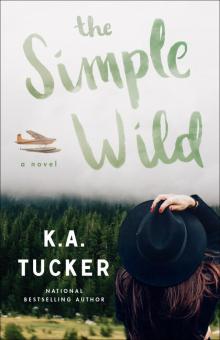 The Simple Wild
The Simple Wild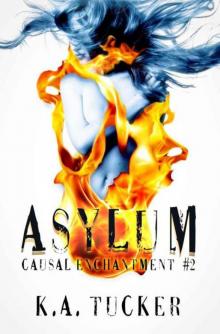 Asylum
Asylum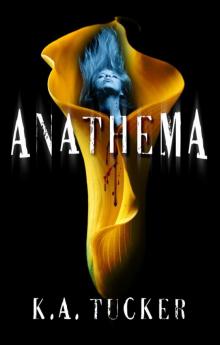 Anathema
Anathema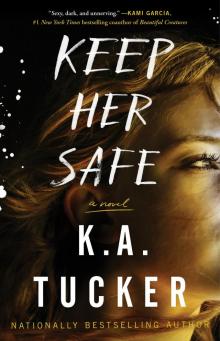 Keep Her Safe
Keep Her Safe Chasing River
Chasing River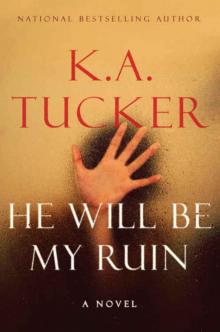 He Will Be My Ruin
He Will Be My Ruin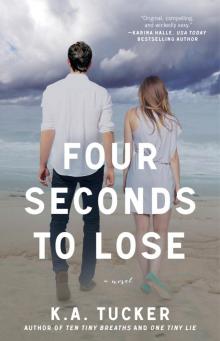 Four Seconds to Lose
Four Seconds to Lose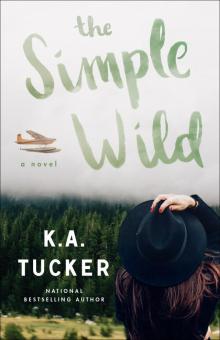 The Simple Wild_A Novel
The Simple Wild_A Novel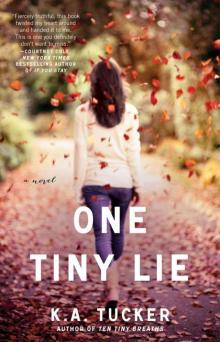 One Tiny Lie
One Tiny Lie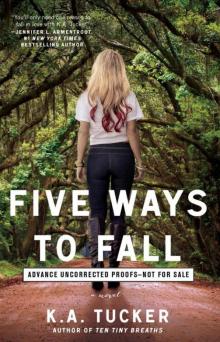 Five Ways to Fall
Five Ways to Fall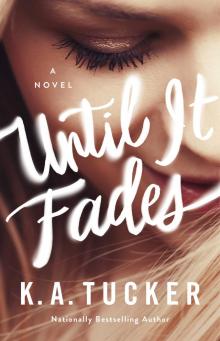 Until It Fades
Until It Fades Allegiance
Allegiance Say You Still Love Me: A Novel
Say You Still Love Me: A Novel Burying Water
Burying Water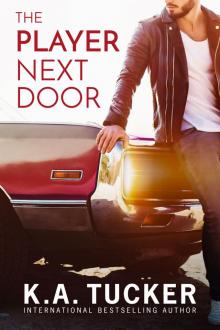 The Player Next Door: A Novel
The Player Next Door: A Novel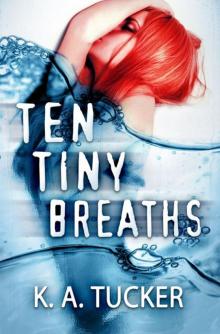 Ten Tiny Breaths
Ten Tiny Breaths A Fate of Wrath & Flame
A Fate of Wrath & Flame Forever Wild
Forever Wild Anomaly
Anomaly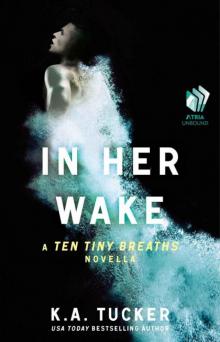 In Her Wake
In Her Wake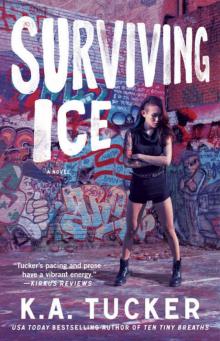 Surviving Ice
Surviving Ice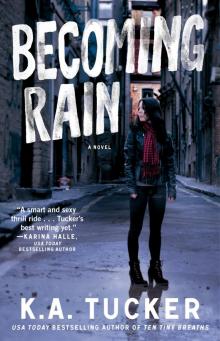 Becoming Rain
Becoming Rain Running Wild: A novel
Running Wild: A novel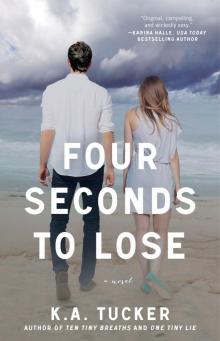 Four Seconds to Lose: A Novel
Four Seconds to Lose: A Novel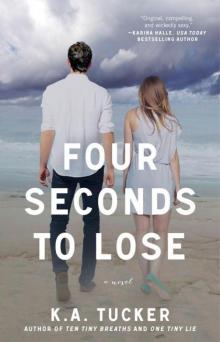 Four Seconds to Lose ttb-3
Four Seconds to Lose ttb-3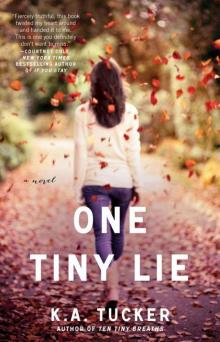 One Tiny Lie: A Novel
One Tiny Lie: A Novel Anomaly (Causal Enchantment)
Anomaly (Causal Enchantment)